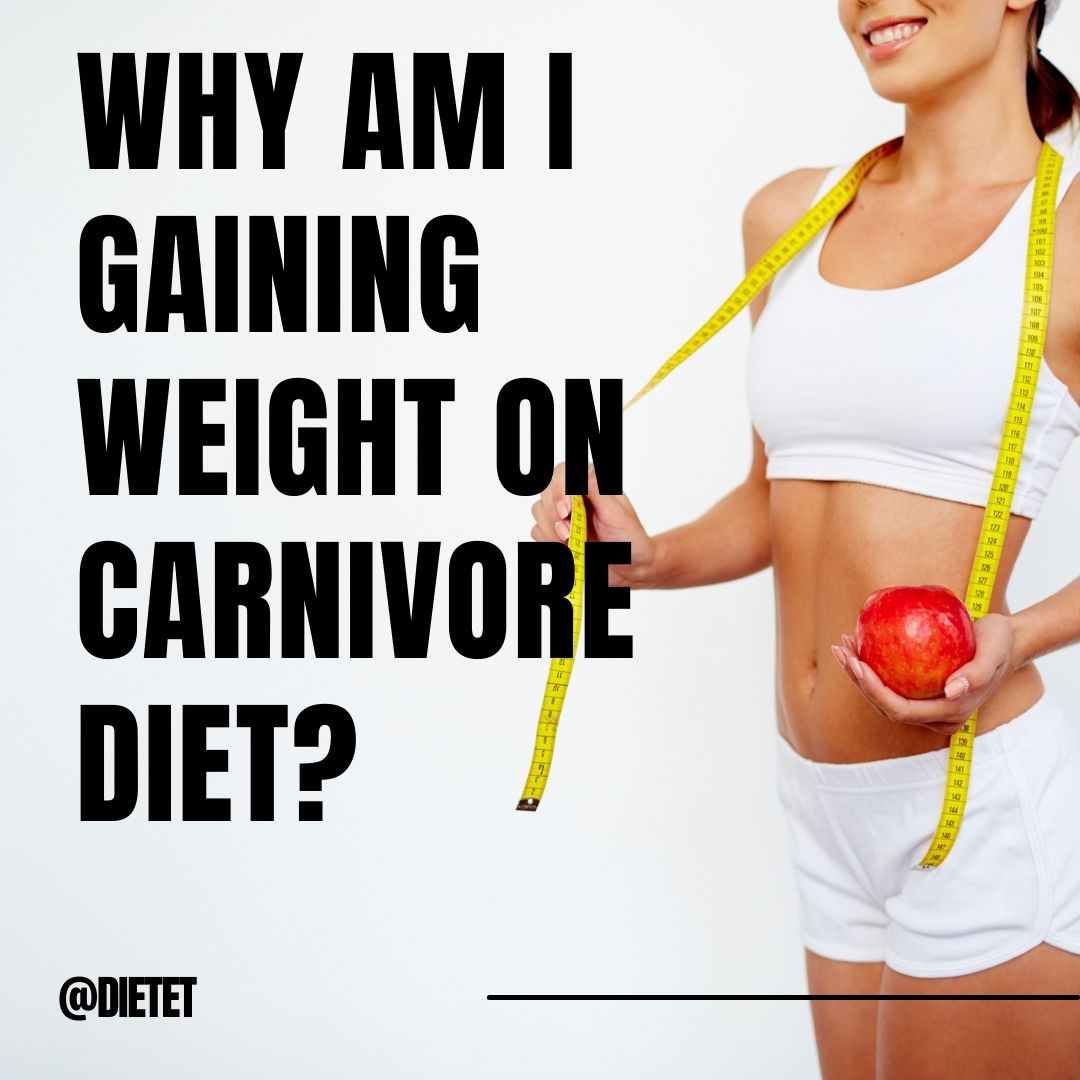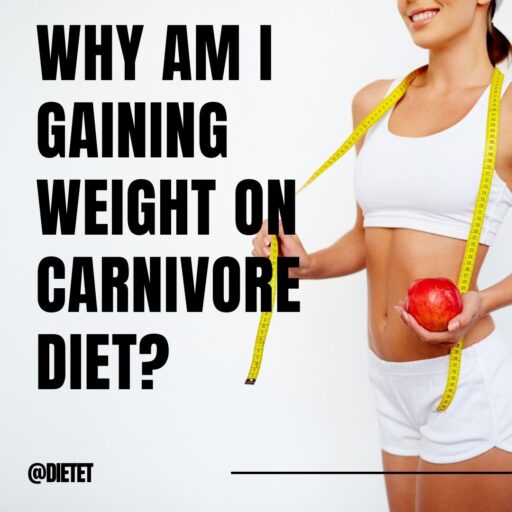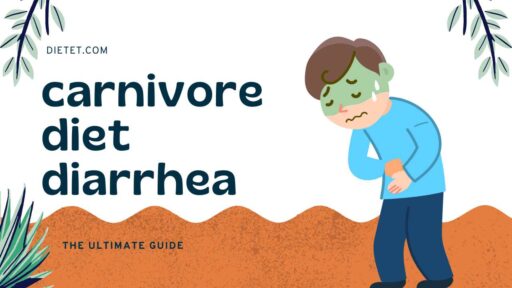Why Am I Gaining Weight On Carnivore Diet? 8 Ultimate Solutions
If you’ve embarked on a carnivore diet and have noticed some unexpected weight gain, you might be feeling worried or confused. Remember, you’re not alone in this. There’s a multitude of reasons why this could be happening. An understanding of these reasons can help set you back on the right track.
“A carnivore diet, contrary to its name, is not just about consuming large amounts of meat. It is about consuming animal products such as meat, fish, eggs, and dairy to optimize health and fitness.”
We’re going to delve into some of the most likely reasons you could be gaining weight on the carnivore diet. Here’s a short preview:
- Caloric overload.
- Insufficient activity levels.
- Challenges in inadaptation to the diet.
- Hormonal changes.
Keep reading to understand these factors in detail and discover effective strategies to manage and mitigate them.

1. Stress and Weight Gain
One fundamental aspect of weight management you might have overlooked is the impact of stress on your body. Stress stimulates the production of cortisol, a hormone that, aside from breaking down lean muscle, weakens the immune system, and affects overall health negatively. This grim cascade of events can lead to unexpected weight gain, even while strictly adhering to your carnivore diet plan.
Managing Stress
It’s essential to incorporate stress management strategies into your daily routine. Regular good quality sleep, spending time outdoors, indulging in relaxing baths with Epsom salts and essential oils, practicing meditation, and minimizing daily life stressors are just a few effective tactics.
2. The Role of Blood Sugar Levels
Stabilizing blood sugar levels is a cornerstone of successful weight management. A surge in blood sugar signals your body to store fat, which could lead to weight gain. Following a carnivore diet closely can be instrumental in maintaining stable blood sugar levels, which not only promotes weight loss but also contributes to overall health.
3. Balance and Trusting Your Body
It’s crucial to remember that the carnivore diet values healing and achieving optimal body balance above all. Therefore, success should not be measured purely by the numbers on the scale, but rather, by the essential balance and wellness of your body. Trust your body’s natural balance and give it the attention it deserves, beyond just its weight.
Exploring the Carnivore Diet
If you’re interested in delving deeper into the carnivore diet, there’s a comprehensive 30-Day Carnivore Diet Challenge eBook available. This guide provides valuable insights into the diet, including rules, meal plans, recipes, and tips for achieving your health goals while following the Carnivore Way of Eating.
Follow us for more Effective Diet Guide
Common causes of weight gain on the carnivore diet.
As you’ve elected to follow the carnivore diet, you might be questioning why the scale is creeping up instead of sliding down. Here’s the thing: every journey differs from one person to the next, and weight gain is not always indicative of a flawed strategy. In some instances, individuals adopt the Carnivore Diet precisely to gain weight for health reasons. However, if unanticipated weight gain has you befuddled, there might be some reasons to explore.
Occasionally sneaking carbs into your diet, also known as cheating, is a significant cause of inadvertent weight gain. Remember, an essential mechanism for weight loss on the carnivore diet is reducing carb intake as well as eliminating processed foods. When carbohydrates sneak back in, it can disrupt the ketogenic state your body is in, leading to weight gain.
Another potential pitfall is the excessive consumption of dairy. Although dairy is technically meat-based, it can be insulinogenic and addictive, causing too much insulin to be released into the body. Excess insulin can lead to the storage of fat and, hence, weight gain. The addictive properties of dairy can also lead to overconsumption, adding to your daily calorie intake and another cause for weight gain.
So, what’s the way out?
Balancing your protein and fat intake may help manage any unnecessary weight gain. In the carnivore diet, a healthy weight loss ratio is generally recommended to be 1 gram of fat to 1 gram of protein. This balance ensures your body gets adequate fuel while maintaining a caloric deficit needed to lose or maintain weight.
To corroborate, weight loss on the carnivore diet may not always be immediate. So, it’s crucial to monitor your overall health and wellness, not just your weight. Remember, the carnivore diet has been shown to improve several health markers, including blood pressure, cholesterol levels, and blood sugar levels, which contribute to a healthier you, often regardless of weight changes.
The key takeaway? Keep in mind that while weight loss might be a key goal for many on the carnivore diet, it’s only one aspect of the overall health and wellness picture. Understanding the nuances of the diet and how it can impact all areas of your health will help guide your journey on this dietary path.
What are the solutions to manage weight gain on the carnivore diet?
Firstly, striking a balance between protein and fat intake is vital. Remember that the ideal ratio for effective weight loss on a carnivore diet is approximately 1 gram of fat to 1 gram of protein. Consume various high-quality, fatty meat cuts to keep the proportions. However, while focusing on maintaining this balance, refrain from overeating to avoid tipping the scale and instigating weight gain.
Many carnivores opt to include dairy in their diet for its rich nutrient profile. Nonetheless, if you’re experiencing weight gain, you should consider reevaluating your dairy consumption. Dairy can not only be insulinogenic, leading to fluctuating blood sugar levels, but it can also be addictive. Both factors may potentially contribute to increased body weight.
Managing stress efficiently can also be a game-changer. Engaging in activities that reduce stress levels, like meditation or yoga, could help. Practice mindful eating, and pay attention to detect feelings of fullness, which will help avoid overeating.
Moreover, don’t forget that weight loss on the carnivore diet may not be immediate. It’s always important to keep an eye on improving health markers rather than just relying on the scale. The carnivore diet, when properly followed, can improve overall health altogether, even without notable weight loss.
Lastly, maintain a steady commitment level to your new carnivore lifestyle. Patience and perseverance are the keys to seeing long-term benefits. Trust the process and remember that your body needs time for this diet to show its effect. Cutting carbs and eliminating processed foods is a significant dietary change that demands a duration for the actual impact to surface.
Remember, each individual’s journey on the carnivore diet is unique, and what works for one person may not work the same for you. Listening and adjusting to your body’s response to this dietary shift is paramount to managing weight effectively.
Does the carnivore diet cause water retention leading to weight gain?
Understanding Water Retention in a Carnivore Diet?
While following a carnivore diet, the tendency for water retention may not be as evident as other diets. However, this doesn’t mean it’s non-existent. Much of this depends on specific foods that you include in your diet.
For instance, foods that are rich in sodium can lead to water retention, creating a temporary spike in your body weight. You might be surprised to hear that some meats, especially packaged or processed ones, can be high in sodium, thus contributing to water retention. However, these fluctuations are temporary and should not hinder your long-term weight management goals.
Keeping a close eye on the types of meats and their processing can help in managing unnecessary water retention. Opting for fresh, unprocessed meats can play a crucial role in this aspect.
Keeping Electrolytes in Balance
Another key factor to consider in a carnivore diet is the balance of electrolytes. A lack of balance in electrolytes can lead to cravings and intense hunger pangs, which, in turn, may lead to increased calorie intake and potential weight gain. Many people may overlook this critical aspect of the carnivore diet, and in doing so, may find themselves gaining weight unexpectedly. It’s important to stay hydrated and consider incorporating an electrolyte supplement if necessary.
To conclude, while the carnivore diet does not directly cause high levels of water retention, imbalanced food intake and electrolyte levels can lead to weight gain. As always, personalized advice from a nutritionist or dietitian can provide the most effective strategy for weight management on a carnivore diet.
How can I modify my carnivore diet to stop gaining weight?
- Implementing a balanced fat and protein intake might be essential for effective weight management on the carnivore diet. An excellent place to start is aiming for a 1:1 ratio of grams of fat to grams of protein.
- Weight loss might not be immediate when transitioning to a carnivore diet. Patience is key to seeing the full benefit.
- It could be beneficial to commit to at least 30 days on the carnivore diet for weight loss success. This allows your body sufficient time to adjust to the new eating style.
- Cutting carbohydrates and eliminating processed foods could be key mechanisms for weight loss on the carnivore diet. These dietary changes can help reduce bloating, water retention, and overall inflammation, all of which can contribute to weight gain.
- Stabilizing blood sugar levels can reduce cravings and lead to overall weight management success. The carnivore diet, with its high protein and fat content, is a great tool for achieving this balance.
- While weight loss is a common reason for following the carnivore diet, the diet might also improve health markers. These improvements can include better sleep, improved mental clarity, and more consistent energy levels.
- < theli>Trying a carnivore diet under proper guidance could be beneficial. You might consider using resources like the 30-Day Carnivore Diet Challenge ebook, which guides meal plans, recipes, and tips for success.
Are there any specific types of meat that cause more weight gain on the carnivore diet?
Interestingly, it’s not so much the type of meat you consume on the carnivore diet, but rather, the cut and preparation method that can influence weight. For instance, fattier cuts of meat, such as ribeye steaks, contain more calories than lean cuts like sirloin. Similarly, meats prepared with added fats or oils, or those that are processed, could contribute to an increase in calorie intake, potentially leading to weight gain.
Cheese and other dairy products are not considered meats, but they’re often included in the carnivore diet as sources of animal-based proteins. However, many dairy products can be high in both sugars and fats, potentially leading to increased calorie consumption and weight gain. Additionally, some people find dairy to be somewhat addictive, which can lead to overconsumption.
In a nutshell, the carnivore diet incorporates a variety of meats and meat products, and the potential for weight gain can largely depend on the choices you make within those categories.
Final Thought
It’s essential to embrace the fact that everyone’s journey to health and fitness is unique and personal. It’s no surprise that you’re concerned about unexpected weight gain while following the carnivore diet. But, take heart that your body is smarter than you think. It has a fantastic, innate ability to discern and fulfill what it needs to function optimally.
Remember what Coach Raymond had emphasized about the detrimental effects of unrealistic body standards fueled by manipulated images? It’s crucial to tune out such distorted perceptions of body image as they can interfere with your overall well-being and the healing process. Your primary focus should be on nurturing your body and building a strong, healthy, and sustainable lifestyle, not merely attaining a photoshopped façade.
FAQ
Q: I was losing weight initially on the carnivore diet. Why am I now gaining weight?
A: Weight fluctuations are common when you change your dietary habits. Your body is trying to adapt, and this stage is often temporary. Sticking to the same eating plan consistently will likely help your body decide what’s a ‘new normal’. The carnivore diet’s focus is to nourish your body adequately, which in turn supports weight management over time.
Q: Why does the carnivore diet seem to cause water retention?
A: This isn’t typically the case. However, increased sodium intake common in diets high in meat could lead to minor water retention. If you believe this might be causing weight gain, try reducing your sodium intake while maintaining your regular carnivorous meal plan.
Q: Can the carnivore diet make me gain fat?
A: Although many people have experienced fat loss on the carnivore diet, each individual’s reaction to dietary change can vary. If you’re gaining undesired weight, consider analyzing your calorie intake versus output and consult with a health professional if needed.
Q: How can I control the weight gain induced by the carnivore diet?
A: If you’re gaining weight, it may be time to refine the specifics of your carnivore diet. Leaner meats, reduced portion sizes, or an increase in physical activity could help. Remember, the principles behind the carnivore diet include proper nourishment, not deprivation; your body will guide you in what it needs.
Q: Are social media physical portrayals of the carnivore diet realistic?
A: Coach Raymond pointed out that the internet is full of misleading images. Always remember that photoshopped physical ideals do not represent health or success on the carnivore diet. Remember, the goal of changing your diet should be to feel better and be healthier, not to achieve an unrealistic image. Your body knows what it needs to thrive; listen to it.




